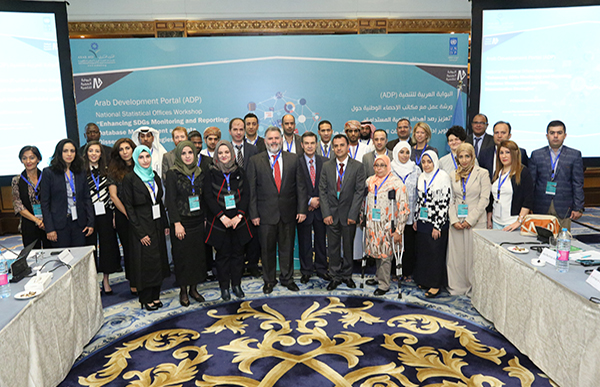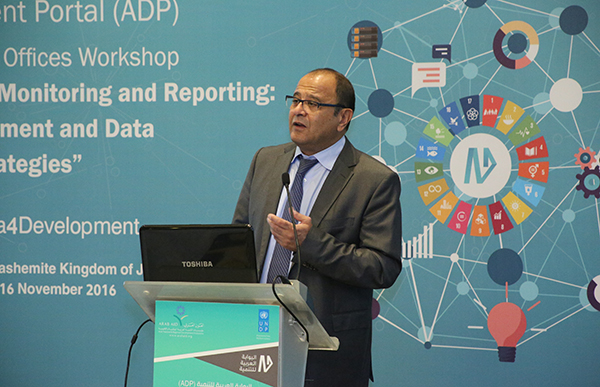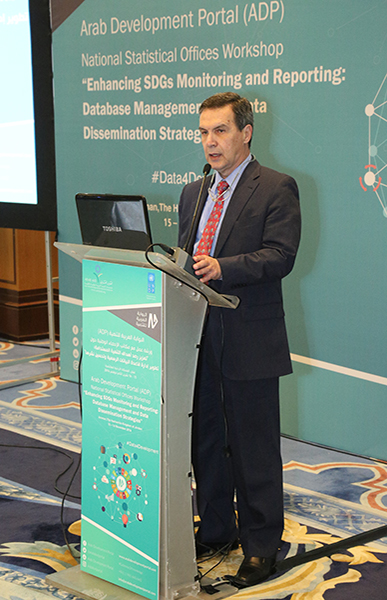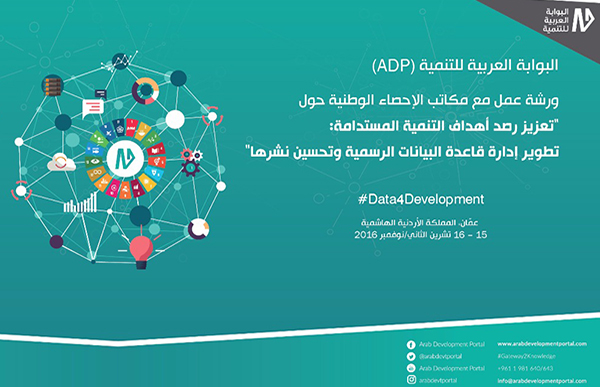Arab statistical offices discuss how to track and visualize progress on SDGs
Amman, Hashemite Kingdom of Jordan
15-16 November 2016
A robust follow-up and review mechanism for the implementation of the 2030 Agenda for Sustainable Development will require a solid and participatory framework of indicators and statistical data to monitor progress, inform policy and ensure accountability of all stakeholders. To support Arab countries in this effort, the Arab Development Portal (ADP) team convened a workshop for National Statistical Offices (NSO) in Amman, on 15 and 16 November 2016. The meeting was attended by 26 representatives from twelve Arab NSOs[1], the GCC stat, and experts from the United Kingdom, South Africa, Brazil and Sweden in a way to nurture regional and international cross-learning.
Building on the success of the Arab Development Portal that hosts around 2,750 indicators on 10 development topics, the ADP team introduced the participants to new techniques, trends and open-source technologies that can be used to manage statistical databases and develop interactive websites and portals. Abdelaziz Almoualimi, Director of the Arab Institute for Training and Research Statistics (AITRS) congratulated UNDP for its achievements on the Portal and pointed out his intention to “keep walking together on the path to achieve the Sustainable Development Goals (SDGs)”.
With data currently available for some of the 241[2] SDG global indicators, with availability ranging from 45.6% in Jordan up to 63% in Egypt[3], countries are making necessary preparations to set national indicators, agree on targets and identify data gaps. Most representatives from Arab NSOs noted that this requires a great deal of coordination with line ministries and national institutions, in addition to dedicate resources to process, collect and disseminate data. Important steps have already been made by countries like Egypt and Morocco, which volunteered to present their progress on the SDGs during last July’s High Level Political Forum in New York. Others, like Jordan, are planning to be part of next year’s National Voluntary Review and an inter-ministerial committee has been established in this regard.
The representative from Palestine, Aisar Abou Tumeh, Head of the Climate Department, noted that for him “the importance of the workshop lies the opportunity to benefit from other countries’ experience, that can be useful to inform the preparation for our next 5-year development plan that needs to be fully in line with the SDGs”. Also Ahmad Al Salboud, Director of Application Development in the General Authority for Statistics of Saudi Arabia expressed his satisfaction with the workshop which provided him with good technical insights in order to “roll out our new system on SDG data, for which we currently have data and methodology for about 45 indicators”. He also noted that Saudi Arabia will be launching its national data warehouse by mid-2017. In addition, Akram Amari, responsible for the website of Tunisia’s National Institute of statistics, declared that they are in the process of preparing for a new project on SDGs monitoring.
Following up previous meetings held earlier this year, the workshop looked at ways to address some of the common issues faced by regional NSOs. These include for example the existence of different databases adopting different technologies, integration of visualization tools into websites, need to familiarize with the latest content management systems and lack of trained staff.
At the heart of the discussion was the consideration that the public user must be at the core NSOs’ work and should be able to easily access and understand data, and that the NSOs should cater for the users’ needs and expectations. In this regard, Lisa Thiel, Head of the Communication Department at Statistics Sweden noted that her country has significant experience in user-friendly data dissemination, and that the workshop has been an opportunity for NSOs in the region to learn more and benefit from it. Thiel said that technological transformations have changed how users approach data and that “sales of statistical books by Statistics Sweden have dropped by 70% since 2005”. This is why they decided to change the way they approach users by targeting the youth and launching a new concept using visual elements and making the website more responsive. For the UK’s Office for National Statistics (ONS) “getting the latest statistics as quickly as possible is the design strategy of the ONS,” said Andrew Dudfield, Digital Service Manager. Also, Bader Shaikhan AlAbdali, Statistician at the Omani National Center for statistics and Information,[4] explained how users nowadays don’t have time to search for statistics in tables and reports, so they decided to include a team of three experts in their organization responsible for producing infographics.
Customizing and upgrading existing Content Management Systems (CMSs) tool was identified as a main challenge for Arab NSOs. Countries relying on open source CMSs expressed their need for assistance to upgrade the current versions. For example, Tunisia is exploring moving from Drupal 7 to Drupal 8, and Iraq expressed interest in upgrading their CMS to the newest Joomla edition. A second group of countries have been outsourcing the construction of their CMSs, and these countries have been facing challenges in setting adequate requirements for modern statistical website like basic and advanced data visualization tools to implement in their CMS, creating independent statistical database to increase the scalability, using NoSQL databases to enhance the user experience in creating mobile apps. Oman, for example, highlighted on the importance of the content of ADP presentations and expressed his intention to use with their negotiations with their service providers developing their current CMS.
Another area of potential collaboration is on building the capacity of NSOs to produce readable and digestible statistical analysis that are visually appealing to the youth and other users. Within the Arab NSOs, data dissemination continues to be viewed as an IT task. In this area, there is a wide discrepancy between the global trends and the regional trends in disseminating official statistics. Showcasing best practices from South Africa, Sweden, UK and Brazil emphasized the need to train statisticians working at NSOs on modern communication and writing skills. For a long period, statisticians were focused solely on producing raw data and statistical tables. With the emergence of modern dissemination tools, like still and interactive infographics, for example, statisticians need to enhance their capacity to write different types of reports and learn storytelling using new data tools.
In this regard, Manal Khuffash, Programmer from the Department of Statistics in Jordan said: “We’ve been waiting for years for a workshop that finally brings together statisticians, IT and communications staff, in order to promote a better coordination between them”. This was echoed by Wafaa Omar from Qatar’s Statistical Researcher in the Population and Social Statistics Department, who said, “We [statisticians] need to sit with the communication staff and agree on the best way to disseminate data and analysis to the general public. All should be able to know how the country is performing on different topics”.
Another important challenge that was highlighted by the NSOs is the outdated and restrictive legislative environment regulating the national statistical system and the work of NSOs. Raqeeb Mohamad, Head of Database and Data Analysis Unit at the Kurdistan Region Statistics Office (KRSO) called for a new legal framework to establish a modern registration system to enhance the production of official statistics. Agadeer Hamza, Senior Statistician at Iraq’s Central Organization, said that the government is working on a new law since 2014, which will replace the 1972 Law.
With the 2030 Agenda having entered into force for almost a year, the ADP team will launch in 2017 a new SDG tracking tool that will be able to monitor progress of countries across the region. Yet, for this to be fully operational, it is necessary that NSOs have the required capacity to gather and analyze data at the national level. This workshop was one of the first steps in this direction and further targeted assistance will be provided to countries in the next months. Most participants emphasized the need for a focused workshop on database architecture, content management systems and data visualization tools within the framework of SDGs. How to make statistical analysis more comprehensible by communications officers and the findings more digestible by public users came on top of NSOs’ priorities. Lebanon, Jordan, Saudi Arabia, Iraq and Egypt have already manifested interest in receiving targeted UNDP support in this regard. A follow-up workshop will be conducted in February 2017 with representatives of NSOs from Lebanon, Sudan, Algeria, Comoros, Libya, Kuwait, Syria, Somalia, Djibouti, United Arab Emirates and Yemen.
[1] Bahrain, Egypt, Iraq, Jordan, Kurdistan, Mauritania, Morocco, Oman, Palestine, Qatar, Saudi Arabia and Tunisia.
[2] Of which general agreement has been reached on 230 indicators. For more information, refer to http://unstats.un.org/sdgs/indicators/indicators-list/
[3] Based on presentations of representatives of the Jordan’s Department of Statistics (DOS) and Egypt’s Central Agency for Public Mobilization and Statistics (CAPMAS).
[4] Won the best website in the GCC region for the year 2015.




